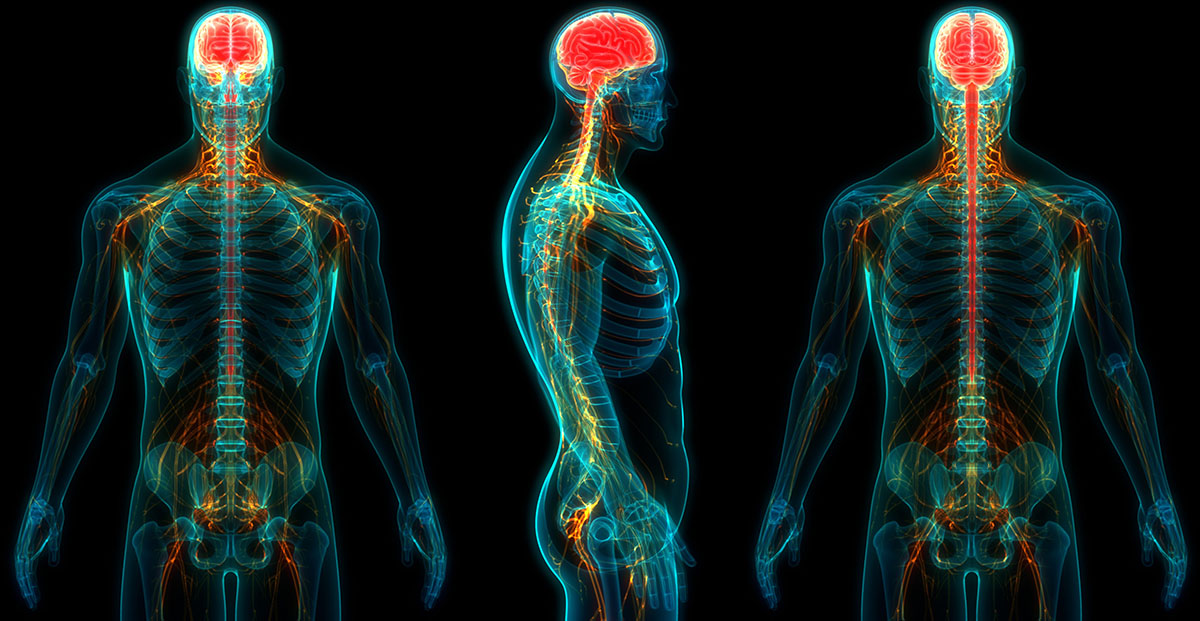Keeping Your Nervous System Healthy
Who ever thinks about keeping their nervous system healthy? We all learned about it in biology class either in high school or college, but when’s the last time you seriously thought about it as something that needs attention and nutrition? The nervous system is critical to our health and existence but it may only be when our nervous system isn’t so healthy (feelings of irritability, fatigue, pain and decreased mental acuity) that we pay attention. Luckily, there are lots of ways to keep it healthy and high functioning.
Neurological Wellness (aka “Neuro-Wellness”)
Many experts are paying attention to a new and emerging field of science called neurological wellness or “neuro-wellness”. It examines the connections between emotional well-being, mood enhancements, and innovations in technology. It focuses on the whole person (physical, emotional, cognitive) as well as prevention, since many disorders are associated with a dysfunctional nervous system.
Diseases and Disorders of the Nervous System
The nervous system is vulnerable and can be damaged by traumatic events, tumors, disruption in blood flow, infections, autoimmune disorders and degeneration. Some disorders of the nervous system include the following:
- Stroke
- Meningitis
- Bell’s palsy
- Carpal Tunnel Syndrome
- Brain and spinal cord tumors
- Headache
- Epilepsy
- Parkinson’s disease
- Alzheimer’s disease
- Huntington’s disease
- Amyotrophic Lateral Sclerosis (ALS)
- Multiple Sclerosis (MS)
The Path to a Healthy Nervous System
Many nervous system disorders are age-related and most people won’t develop symptoms until later in life. While good nutrition in our older years is vital, eating lots of healthy foods throughout our lives can act to reduce risk of developing these conditions or prevent them altogether. We also need to focus on behaviors and routines that can aid in the health of the nervous system.
Nutrients, Minerals and Nervous System Health
We need to provide nutrients to the nerves throughout the system so they can better transmit messages and maintain health. The following include some of the most important nutrients and vitamins to get into our diet on a daily basis for good nervous system health.
B Vitamins – The Protectors of Nerves
Vitamins B1, B2, and B6 help nerves send impulses from the brain to the rest of the body. All nerves have a protective coating called the myelin sheath. B12 helps protect it from wearing down and can help in reducing the risk of developing Alzheimer’s disease. B vitamins are found in beef, chicken, sea food, eggs, low-fat milk, yogurt and cheese. Folate or vitamin B9 also protects nerves from damage by chemicals and is plentiful in beets, pomegranates, and spinach.
Minerals – The Regulators or Electrical Impulses
Calcium and potassium help regulate electrical impulses both generated and transmitted by the nerves. Think of potassium as the key to your inner electrical system and calcium as the spark of life. These minerals are needed in every cell in the brain and body. Potassium is found in bananas, oranges, prunes, dark leafy green and pomegranates and calcium is plentiful in baked potatoes with the skin on, salmon, dried apricots, and milk.
The Power of Dark Chocolate
A piece of dark chocolate a day might keep the doctors away. Dark chocolate contains antioxidants, which have shown to increase brain function, blood flow in the brain and improvement in cognitive function later in life. It also contains tryptophan, an amino acid that acts like a neurotransmitter which transmits signals from one cell to another throughout the nervous system.
Vitamin D and Nerve Health
It’s a sad fact that most people in the United States don’t get enough vitamin D in their daily diets and are actually deficient in this important vitamin. Low vitamin D is associated with risks to many nervous system disorders including Multiple Sclerosis and Schizophrenia. Research has also found that vitamin D protects nerves and decreases inflammation throughout the nervous system. Vitamin D can be absorbed through sunshine and eating salmon, cod liver oil, canned tuna, egg yolks, mushrooms, milk, orange juice and oatmeal.
Healthy Fats are Good for the Nervous System
Polyunsaturated fatty acids found in nuts, seeds, fish, and green leafy vegetables are healthy for the nervous system as are monounsaturated fatty acids found in extra virgin olive oil, nuts and avocados. These healthy fats may reduce the risk of developing dementia and depression. Omega 3-fatty acids are the very building blocks of the brain and are essential for learning and memory. These fatty acids are found in salmon, tuna, flaxseed, walnuts, soybean oil and canola oil.
Other Ways to Keep the Nervous System Healthy
- Eat several small meals a day to prevent drops in glucose which provides energy to nerves.
- Sleep 7 to 8 hours per night as good quality sleep strengthens circuits throughout the nervous system which are associated with memory.
- Regular exercise is associated with better brain health and memory. It also increases blood flow to the hippocampus which is an area directly impacted by Alzheimer’s disease.
- Enjoy beer, wine and other alcoholic beverages, just don’t over do it. Excessive use of alcohol and alcoholism can do a lot of damage to the nervous system. It contracts brain tissues, destroys brain cells and depresses the entire system which may lead to problems with cognition and memory.
- There is no good health outcome associated with smoking, especially when it comes to the nervous system. Tobacco contains nicotine which is both a stimulant and a depressant to the system. Nicotine causes a release of epinephrine that stimulates the nervous system and causes sensations of pleasure, an energy rush, and possible addiction.
Final Thoughts on Keeping Your Nervous System Healthy
While nervous system health may not be on our minds, it is critical to get the right nutrients and vitamins in our bodies on a daily basis. It is equally as important to keep our bodies in good shape by getting adequate sleep and exercise, and avoiding tobacco products and excessive alcohol. All of this is important throughout life, but even more so in later life, when a compromised nervous system may lead to various diseases, disorders and poor health outcomes.












